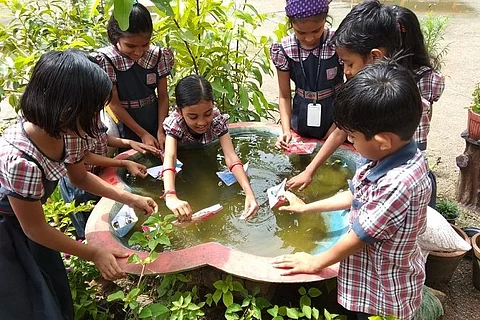

Friday, July 28, was a holiday for schools in Kerala on account of Muharram. The five-year-old girl in Aluva, whose abduction, sexual assault, and murder made headlines the day after, was at home with her three siblings while her parents, who are migrant labourers from Bihar, had gone to work. That the accused took her away from home when the children were alone without adult supervision has sparked discussions about the safety of migrant children in the state. In light of the horrific crime, Minister for Law & Industries Minister P Rajeev announced on Tuesday that the government will take steps to create daycare and creche facilities centred around schools in Aluva and Perumbavoor regions, where several thousands of migrant labourers live.
On TNM’s visit to Aluva two days after the crime, several people expressed similar concerns over the safety of these children. Most migrant parents do not have the support of extended families. Unlike local residents, there is no grandparent or relative to whom they can usually entrust their children with when they go out to work on a school holiday. Many TNM spoke to agreed that the child’s death was also a result of lack of support from extended families. “On school days, the children can be sent to school. But on days with no school, what can these working parents do?” asked Thajudheen, a worker at the Aluva market.
Ambika PS, an Anganwadi worker in Thaikkattukara, added that migrant parents face several other difficulties due to this. “Recently, a pregnant migrant woman had difficulty finding someone to take care of her two older children when it was time for her delivery. Her house owner assisted her in the hospital, but then she was told that she would have to vacate the house unless someone from her family came to Kerala to take care of the children. Eventually someone came,” she said.
In opening creches and daycares, the government hopes to offer respite to migrant parents. “The possibility of organising daycare centres around the schools attended by guest workers’ children is being considered. The aim is to avoid a situation where children are left alone at home after school hours and on holidays as their parents go to work. Creches will be prepared where necessary,” a press release said.
However, this project should be done through a consultative process, said Benoy Peter, executive director of the Centre for Migration and Inclusive Development (CMID). Such projects are often populist, knee-jerk reactions that do not consider long-term feasibility, he argued. While saying that establishing daycares and creches is a step in the right direction, Benoy said that clusters where migrant families live must be first mapped. “All places where migrant labourers live do not need such facilities. We need to identify those areas where migrant families live and introduce these facilities there. Care should be taken to not make these centres exclusive for children of migrant labourers, as that can be discriminatory,” he said.
Advocating for mainstreaming of migrant labourers and their families, Benoy said that the introduction of daycare or creche facilities shouldn’t lead to excluding them from the existing Anganwadi system. “The Anganwadi system is crucial as it ensures that children receive the essential nutrients at that age. It is critical that children of migrant labourers benefit from this facility,” he said. On the same note, Benoy highlighted the need to make existing facilities accessible for working parents. “Anganwadis that function from 9 am to 3.30 pm are not helpful for a parent who leaves for work at say 7 am and gets back only by 6 pm. The timings of Anganwadis will have to be extended to include these children. This can even be implemented universally as all working mothers will benefit from this,” he suggested.
Another subject that saw a lot of discussion in the days after the crime was the apparent need for mandatory registration of all migrant labourers in the state. Benoy cautioned that this would amount to a violation of fundamental rights. “Compulsory registration will violate the rights of the labourers. It will not help track delinquent persons either. However, voluntary registration can be offered. Local self-governments can instead attempt enumeration, that is list the number of migrant labourers in a given LSGD’s jurisdiction. This, however, will be a dynamic database, as the population will keep moving,” he said.
“Another problem with registration is what documents will the labourers have to furnish, will they have to submit their biometric details? These would constitute an invasion of their privacy and violation of their rights,” he pointed out.
Benoy said that including the migrant labourer population in the state’s mainstream is the ideal solution. “If they are completely integrated into the mainstream, delinquent or anti-social elements will get flagged. What is needed is friendship with the migrants, not a xenophobic outlook. The Malayali population has benefited greatly from our expatriate community. We should know not to look at migrant labourers as second class citizens,” he added.